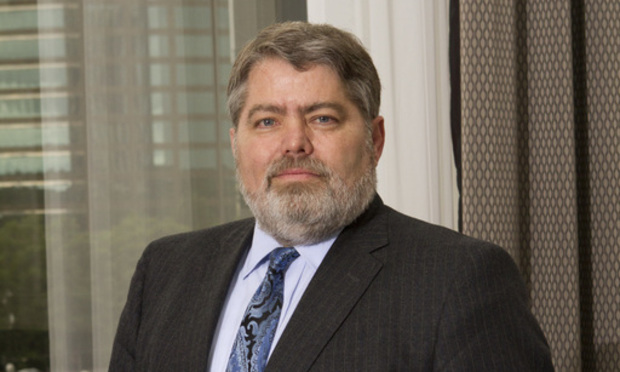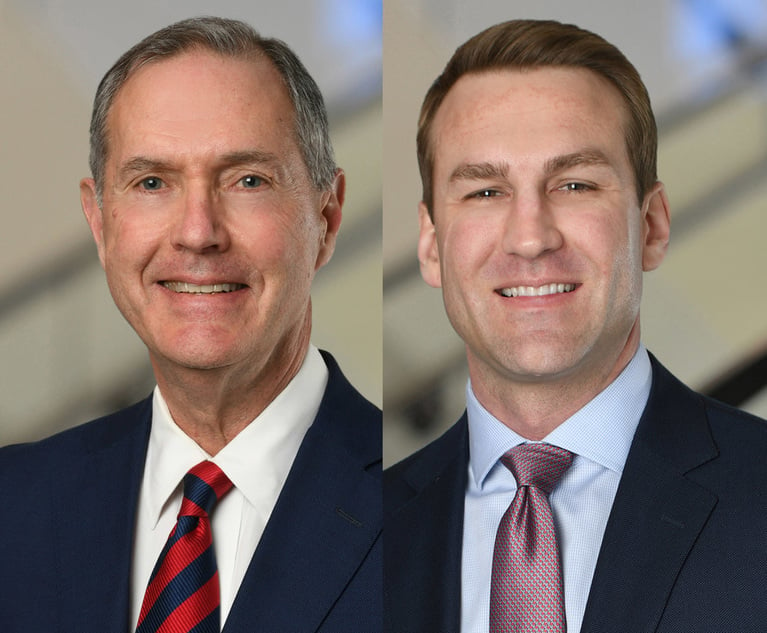Side Benefits of Oral Argument: Training, Fun, Predicting the Future
Oral arguments have an intangible value that lawyers and judges seem to understand instinctively. At best, they're conversations—starting in midsentence with many interruptions—that mostly seem mutually useful.
December 14, 2017 at 12:21 PM
3 minute read

(This is the fourth article in a four-part series looking at the declines in oral arguments.)
Oral arguments have an intangible value that lawyers and judges seem to understand instinctively. At best, they're conversations—starting in midsentence with many interruptions—that mostly seem mutually useful.
“I love doing oral arguments,” said Michael Terry of Bondurant, Mixson & Elmore.
Terry does them often and successfully in state and federal courts. On a good day, he has the feeling the judges find them helpful.
“It's not that the court really needs our help sometimes; it's more that the court really wants to know our positions,” Terry said.
Robert Highsmith Jr. of Holland & Knight said he generally asks for oral arguments and gets them, although he noted his cases tend to involve public policy or other broad-based issues.
“I think oral argument is crucial to courts' understanding of a case,” Highsmith said. “And I think courts enjoy it.”
Laurie Webb Daniel, chair of Holland & Knight's national appellate team and leader of the firm's Atlanta litigation practice, said oral arguments have another use that is not usually noted in the discussions about their decline: They can influence settlements.
A lot of cases settle after oral arguments, Daniel said. If that happens quickly, it still reduces the court's workload by eliminating the need to write an opinion.
Especially now with oral arguments live-streamed and available afterward by video on Georgia appellate court websites and with audio recordings on federal court websites, parties are looking increasingly at oral arguments. “It's reading tea leaves, I know,” Daniel said. “But I will tell you based on my experience, most times you can get a sense of how it's going to go.”
Of course, it's not always possible to tell how the judges are leaning, she added. “But most times—particularly if you get hostile questioning for one of the parties—most times that party does not win,” Daniel said.
An important concern about the decline in the use of oral arguments is the limiting of opportunity for experience by younger lawyers. Daniel said a way to address that is by having younger associates volunteer for court appointed federal cases. In those situations, the judges will grant oral arguments.
“And they will thank you for doing it,” Daniel said.
Also, firms can help prepare younger lawyers by practicing with mooting cases and staging mock arguments. Daniel said she does that herself.
“Anyone going into an appellate argument should do moot court,” she said. “If you're going to have an argument, you ought to practice.”
But, from what lawyers say, the experience of arguing live before a bench is something that can't quite be replicated. Criminal defense attorney J. Scott Key of Miller & Key in McDonough has made many appearances before the Georgia Supreme Court. After one of them a couple of years ago, he joked in a tweet linking his photo and a story in the Daily Report, “That was me on the receiving end of the Socratic method.”
Here's how he described the experience at the time for a reporter: “Before I do it, I always feel like I'm going to be sick. Afterward, I think it's the most fun thing I've ever done.”
This content has been archived. It is available through our partners, LexisNexis® and Bloomberg Law.
To view this content, please continue to their sites.
Not a Lexis Subscriber?
Subscribe Now
Not a Bloomberg Law Subscriber?
Subscribe Now
NOT FOR REPRINT
© 2025 ALM Global, LLC, All Rights Reserved. Request academic re-use from www.copyright.com. All other uses, submit a request to [email protected]. For more information visit Asset & Logo Licensing.
You Might Like
View All
Law Firms Expand Scope of Immigration Expertise Amid Blitz of Trump Orders
6 minute read
Bass Berry & Sims Relocates to Nashville Office Designed to Encourage Collaboration, Inclusion
4 minute read
Gunderson Dettmer Opens Atlanta Office With 3 Partners From Morris Manning
3 minute read
Trending Stories
- 1Uber Files RICO Suit Against Plaintiff-Side Firms Alleging Fraudulent Injury Claims
- 2The Law Firm Disrupted: Scrutinizing the Elephant More Than the Mouse
- 3Inherent Diminished Value Damages Unavailable to 3rd-Party Claimants, Court Says
- 4Pa. Defense Firm Sued by Client Over Ex-Eagles Player's $43.5M Med Mal Win
- 5Losses Mount at Morris Manning, but Departing Ex-Chair Stays Bullish About His Old Firm's Future
Who Got The Work
J. Brugh Lower of Gibbons has entered an appearance for industrial equipment supplier Devco Corporation in a pending trademark infringement lawsuit. The suit, accusing the defendant of selling knock-off Graco products, was filed Dec. 18 in New Jersey District Court by Rivkin Radler on behalf of Graco Inc. and Graco Minnesota. The case, assigned to U.S. District Judge Zahid N. Quraishi, is 3:24-cv-11294, Graco Inc. et al v. Devco Corporation.
Who Got The Work
Rebecca Maller-Stein and Kent A. Yalowitz of Arnold & Porter Kaye Scholer have entered their appearances for Hanaco Venture Capital and its executives, Lior Prosor and David Frankel, in a pending securities lawsuit. The action, filed on Dec. 24 in New York Southern District Court by Zell, Aron & Co. on behalf of Goldeneye Advisors, accuses the defendants of negligently and fraudulently managing the plaintiff's $1 million investment. The case, assigned to U.S. District Judge Vernon S. Broderick, is 1:24-cv-09918, Goldeneye Advisors, LLC v. Hanaco Venture Capital, Ltd. et al.
Who Got The Work
Attorneys from A&O Shearman has stepped in as defense counsel for Toronto-Dominion Bank and other defendants in a pending securities class action. The suit, filed Dec. 11 in New York Southern District Court by Bleichmar Fonti & Auld, accuses the defendants of concealing the bank's 'pervasive' deficiencies in regards to its compliance with the Bank Secrecy Act and the quality of its anti-money laundering controls. The case, assigned to U.S. District Judge Arun Subramanian, is 1:24-cv-09445, Gonzalez v. The Toronto-Dominion Bank et al.
Who Got The Work
Crown Castle International, a Pennsylvania company providing shared communications infrastructure, has turned to Luke D. Wolf of Gordon Rees Scully Mansukhani to fend off a pending breach-of-contract lawsuit. The court action, filed Nov. 25 in Michigan Eastern District Court by Hooper Hathaway PC on behalf of The Town Residences LLC, accuses Crown Castle of failing to transfer approximately $30,000 in utility payments from T-Mobile in breach of a roof-top lease and assignment agreement. The case, assigned to U.S. District Judge Susan K. Declercq, is 2:24-cv-13131, The Town Residences LLC v. T-Mobile US, Inc. et al.
Who Got The Work
Wilfred P. Coronato and Daniel M. Schwartz of McCarter & English have stepped in as defense counsel to Electrolux Home Products Inc. in a pending product liability lawsuit. The court action, filed Nov. 26 in New York Eastern District Court by Poulos Lopiccolo PC and Nagel Rice LLP on behalf of David Stern, alleges that the defendant's refrigerators’ drawers and shelving repeatedly break and fall apart within months after purchase. The case, assigned to U.S. District Judge Joan M. Azrack, is 2:24-cv-08204, Stern v. Electrolux Home Products, Inc.
Featured Firms
Law Offices of Gary Martin Hays & Associates, P.C.
(470) 294-1674
Law Offices of Mark E. Salomone
(857) 444-6468
Smith & Hassler
(713) 739-1250






